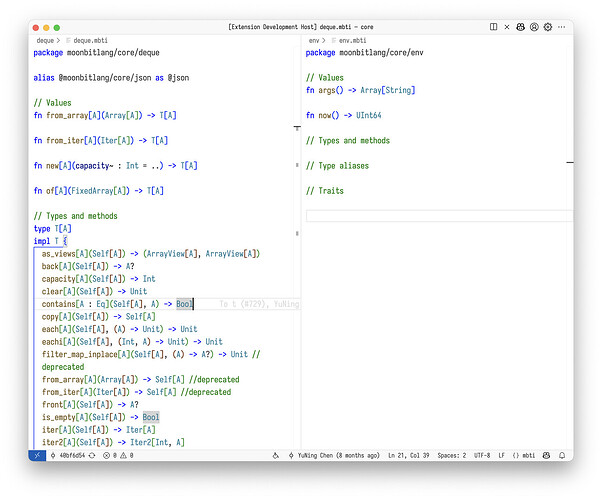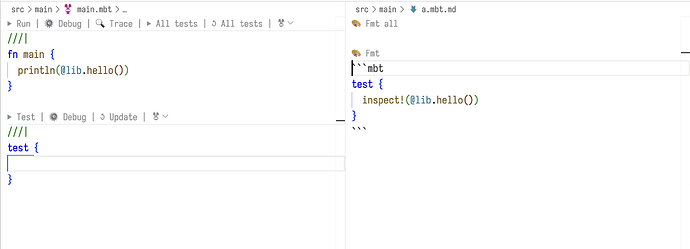2025-03-24
Language Updates
Pattern Matching for Bytes
Bytes can now use array patterns for pattern matching.
fn main {
let bytes : Bytes = "Hello, world!";
match bytes {
[..b"Hello", ..] => {
println("Starts with \"Hello\"");
}
_ => {
println("Doesn't start with \"Hello\"");
}
}
}
Char Literals as Int & Byte
Character (Char) literals can now be used in places where an Int value is expected, with the semantic meaning being their corresponding Unicode code point. Additionally, character literals can also be used in places where a Byte value is expected, but if the Unicode code point exceeds the Byte range, an error will be raised.
fn main {
let a : Int = 'a';
println(a) // 97
let b : Byte = 'a';
println(b) // b'\x61'
let c : Byte = '🎉';
// ^^^ Error: Char literal '🎉' for Byte is out of range.
}
Adjustments to Escape Sequences in String and Bytes Literals
Due to ambiguities in interpreting escape sequences like \x.. and \o.. in different contexts (e.g., String type vs. Bytes type), we have made the following adjustments:
- In string literals used in
String-typed positions, the escape sequences\xFFand\o377are now deprecated. It is recommended to use\u00FFor\u{FF}instead for better clarity. This change does not affectBytesliterals or string literals overloaded toBytes, as shown in the following example:
let bytes1: Bytes = "\xFF\o377"; // ok
let bytes2 = b"\xFF\o377"; // ok, bytes2 == bytes1
let str: String = "\xFF\o377"; // warning: deprecated escape sequences
-
Support for UTF-16 surrogate pairs (e.g.,
\uD835\uDD04) has been removed. For characters beyond the BMP (Basic Multilingual Plane) code points, use\u{...}instead. -
Unicode escape sequences are now deprecated in
Bytesliterals (b"...") and string literals overloaded toBytes("...").
let bytes1 = b"\u4E2D"; // deprecated, use b"\xE4\xB8\xAD" instead
let bytes2 = ("\u4E2D" : Bytes); // use ("\xE4\xB8\xAD" : Bytes) instead
Operator Overloading with Traits
Operator overloading is no longer implemented by adding methods like op_add/op_mul/… to types. Instead, it is now implemented by implementing standard library (core) traits such as Add/Mul, etc. Below is a mapping of operators to their corresponding traits:
| Operator | Trait |
|---|---|
== |
Eq |
+ |
Add |
- |
Sub |
* |
Mul |
/ |
Div |
- (prefix) |
Neg |
% |
Mod |
& |
BitAnd |
| |
BitOr |
^ |
BitXOr |
<< |
Shl |
>> |
Shr |
If your code has custom operator overloading, you should replace method definitions with corresponding trait impl implementations. In the future, using methods for operator overloading will trigger warnings. Once the method-based overloading is fully removed, using methods to overload operators will result in compilation errors.
If your code defines traits containing operators, you should change those trait definitions to declare super traits corresponding to the operator. For example:
trait Number {
op_add(Self, Self) -> Self
op_mul(Self, Self) -> Self
literal(Int) -> Self
}
Should be changed to:
trait Number : Add + Mul {
literal(Int) -> Self
}
Function Aliasing
The syntax is fnalias <old_fn_name> as <new_fn_name>. Function aliases allow users to conveniently use package functions and help with refactoring when functions are moved across packages.
fnalias @hashmap.new // Equivalent to fnalias @hashmap.new as new
fn f() -> Int {
new().length()
}
fnalias f as g
fn main {
println("f: \{f()}")
println("g: \{g()}")
}
fnalias also supports batch import syntax:
fnalias @pkg.(f1s as g1, f2 as g2, ..)
Batch Import for Type & Trait Aliases
typealias @pkg.(A, B, C)allows batch import of types.traitalias @pkg.(D, E, F)allows batch import of traits.
For example, if the lib package defines two types A and B, each with a new method, another package can alias them as follows:
typealias @lib.(A, B)
fn main {
println(A::new())
println(B::new())
}
Removed type T for External Type Syntax
The type T syntax for defining external types has been officially removed. External types must now be defined using extern type T. The type T syntax itself has not been removed but has gained a different meaning.
extern type Tdefines a completely external type that does not participate in MoonBit’s garbage collection.type Tnow defines a regular MoonBit type that is garbage-collected.
This new meaning of type T, combined with the newly added C FFI external object feature, enables dynamic management and release of FFI external objects.
C FFI Finalizers
By calling moonbit_make_external_object on the C side, FFI authors can register a custom destructor function to release resources associated with an object. Here’s an example:
// MoonBit side
type Greeting // Note: not extern type
extern "c" fn Greeting::new() -> Greeting = "greeting_new"
fn main {
ignore(Greeting::new())
}
// C side
#include "moonbit.h" // Make sure to add $MOON_HOME/include to the include paths
#include <stdlib.h>
#include <stdio.h>
char message[] = "Hello, World!";
struct greeting {
char *data;
};
void greeting_delete(void *object) {
fprintf(stderr, "greeting_delete\n");
free(((struct greeting*)object)->data);
// No need to free the object itself; MoonBit’s reference counting will handle it.
}
struct greeting *greeting_new(void) {
char *data = malloc(sizeof(message));
/* moonbit_make_external_object(
void (*func_ptr)(void*),
int32_t size
)
Where:
- `func_ptr` is a function pointer responsible for releasing the resources stored in the object.
- `size` is the size of the custom data within the object, measured in bytes.
`moonbit_make_external_object` allocates a MoonBit object with a total size of
`size + sizeof(func_ptr)` and returns a pointer to its data.
`func_ptr` is stored at the end of the object,
so the returned pointer can be directly used as a pointer to the custom data.
If there are other C APIs that accept `struct greeting*`,
you can directly pass a MoonBit value of type `Greeting` to them without conversion.
*/
struct greeting *greeting =
moonbit_make_external_object(&greeting_delete, sizeof(struct greeting));
greeting->data = data;
return greeting;
}
LLVM Debugging
The LLVM backend has initially implemented the ability to print local variable values in the debugger. Developers using gdb, lldb, and other debugging tools can now view local variable values for basic data types (integers, floating-point numbers). Support for strings, arrays, and complex data structures is actively in development.
Build System Updates
- The bleeding-edge Windows toolchain now supports the LLVM backend. Windows users can install it as follows:
$env:MOONBIT_INSTALL_VERSION = "bleeding"; irm https://cli.moonbitlang.com/install/powershell.ps1 | iex
- A
devversion of the toolchain is now available, which retains more debugging information for diagnosing compiler issues and errors. Install it using:
# Unix (Linux or macOS)
curl https://cli.moonbitlang.com/install/unix.sh | MOONBIT_INSTALL_DEV=1 bash
# Windows (PowerShell)
$env:MOONBIT_INSTALL_DEV = 1; irm https://cli.moonbitlang.com/install/powershell.ps1 | iex
# moon
moon upgrade --dev
Note: The dev toolchain does not support the LLVM backend yet.
- MoonBit-supported Markdown files can now be tested. These test code snippets will run as black-box tests:
moon test --md
IDE Updates
-
IDE now supports syntax highlighting for
mbtifiles.
-
Codelens in the IDE now includes emojis.
-
Markdown files with a
*.mbt.mdsuffix now enable MoonBit LSP support (including error messages, completion, etc.).

